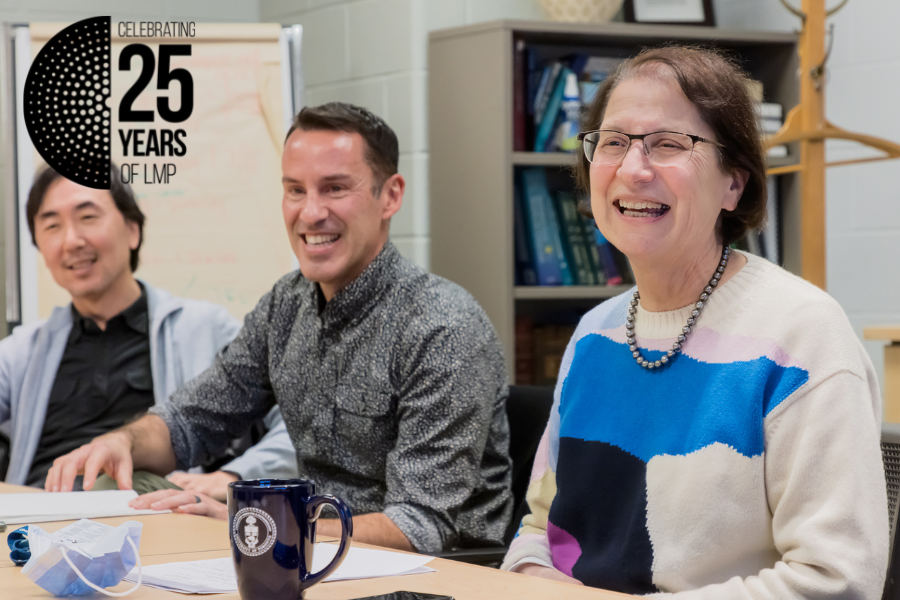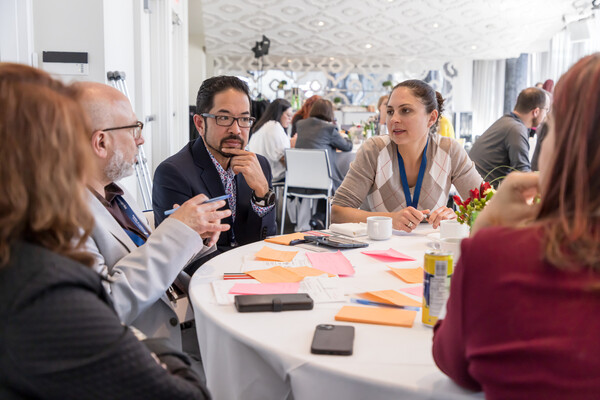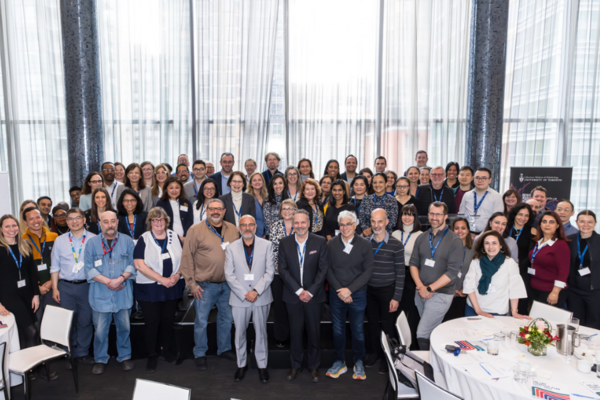Supporting people to grow and help others: the future of LMP

This is the third in our series of Chairs interviews to celebrate 25 years of LMP. Visit the celebration web page to find out more.
“When LMP was established 25 years ago, artificial intelligence wasn’t even a concept, yet now it is one of the department’s main themes. It’s certainly extraordinary to see how much LMP has evolved.” Current Chair of the Department of Laboratory Medicine and Pathobiology in the Temerty Faculty of Medicine, Dr. Rita Kandel, muses over three lessons she has learned, related to the future of LMP. “First I have learned that prediction is fruitless, instead the forward focus needs to be on preparing for change. Second, paraphrasing Abraham Lincoln, the best way to prepare for the future is to create it. Third, the traditional appreciation of basic science research as the sole worthwhile goal of academia has given way to also prizing a multitude of other contributions”.
Rita was a member of the Department of Pathology before the merger so has been part of the evolution of LMP since the beginning. Although she never had ambitions to become a leader, she eventually recognized that her vision for LMP could be best implemented by serving as Chair. She envisioned a department that was “flexible enough to adapt to change, energetic enough to contribute to progress, and encompassing enough to value all forms of productive creativity”. With the LMP strategic plan 2023 – 2028 launching next month, she has focused lately on what makes LMP so special and how to amplify that.
“LMP has always thrived on excellence, but what does that actually mean? I feel it is an overused word and I wanted to specify what it should mean specifically to us. When I started my career, the dogma was that only bench research meaningfully advanced science. Being a Clinician-Investigator, I believe that bench research requires nurturing because it is an investment that underpins most advances in clinical medicine, but I also strongly believe there are other creative ways we can all contribute which are equally valid. Many types of scholarly activity contributes to advancing knowledge, such as excellence in pedagogy, administration, advocacy, translational research, and clinical activities. These are all criteria for promotion and LMP is grateful to former Chair, Dr. Rick Hegele, for formalizing rewards for all forms of scholarly activity.”
Having faced adversity in her career as a woman and a clinician scientist lacking a PhD, Rita is dedicated to ensuring LMP is a place where anyone has the opportunity to be their best. Initiatives like forming the Wellness, Inclusion, Diversity and Equity (WIDE) committee in 2019 and focused recruitment and promotion support, has resulted in a more diverse department with almost 50% of faculty being female. Equity, Diversity, and Inclusion (EDI) principles are a strong focus throughout the new strategic plan. “Enabling a broad range of activity in a way that is equitable and inclusive, that supports diversity, is very important to me”.
“I am grateful to the department and Mount Sinai for supporting me in building an incredibly satisfying career. One way I can express my thanks is by ensuring that everyone in LMP receives the same opportunity to develop the career they seek. My challenge is to draw out the best in every individual of our community. Success in helping people reach their learning and career goals has been the most fulfilling aspect of my job.”
Rita is the first female LMP Chair, an accomplishment she is proud of. But being a woman is only one of many ways she defines her professional self. “Advocate, Pathologist, scientist and leader are equally important to me.”
Her appointment as Chair came at a pivotal moment for LMP. Laboratory Medicine was not only rapidly progressing but also expanding to fields as diverse as precision medicine, point of care monitoring, and artificial intelligence. “The advances in technology were so revolutionary that obtaining answers to questions we never even dared ask before became feasible,” she commented.
Designing an education program that nurtures our learners to grow into this new world became a priority. This sparked a number of educational reviews in her first term which led to many improvements to the undergraduate and graduate research stream programs. In addition, LMP transferred the Translation Research Program from the Institute of Medical Sciences and launched a new MHSc in Laboratory Medicine. Further developing all educational programs across the department, in an accessible and inclusive way, is the focus of Pillar 5 of the new strategic plan.
Rita’s leadership has had a big impact across many aspects of LMP, but the most notable recent development has been the creation of The Temerty Centre for Artificial Intelligence Research and Education in Medicine (T-CAIREM).
“At first glance it seemed inappropriate to focus on a method rather than a disease as that is not historically what we have done, but I see artificial intelligence as a revolutionary technique destined to advance both basic science research and laboratory medicine disciplines. Pivoting to a technique is part of the change we need to encompass to adapt to the future. This is why I wanted our department to be the home for a new AI center. We worked hard to create a proposal which I am grateful to the Dean for supporting. The whole process taught me a very valuable lesson in how important being prepared was to success: if you build it, the funding will come.”
T-CAIREM has now developed a network of more than 25 universities across Canada with over a thousand members, all working towards developing AI and machine learning approaches in healthcare and medical education. “What Dr. Muhammad Mamdani (Director, T-CAIREM) and the whole team have achieved in a scant two years has been beyond my wildest dreams.”
Although Rita has one eye firmly on the future for LMP, she, and the upcoming strategic plan, are not about predicting what is to come, but ensuring LMP is ready for anything.
“Thinking you can predict what's going to happen in 10 or 20 years is a fool’s game – no one can know. I'm not even sure you can predict tomorrow anymore as everything changes so rapidly. I truly believe that you have to build your own future and that is what we’re doing in LMP. We are growing our department by bringing out the strengths of individuals, by hiring the best people across our different fields, and by preparing our learners to accomplish that degree of excellence - and we will do it all in an equitable, fair, and inclusive way. Collaborations between clinicians and basic scientists and researchers who translate discoveries and innovations into the clinical realm quickly is something we want to nurture more of.”
The process of developing the new LMP strategic plan was one that engaged faculty, learners and staff across the department and reinforced what Rita felt was at the core of LMP – its people.
“It became very obvious through our discussions, surveys and focus groups that there was a strong common theme of who we are. This is a testimony to Dr. Avrum Gotlieb’s success in achieving his articulated goal of bringing us together. As he recognized, it’s the people in LMP, their strive for excellence, and their drive to improve the health of our communities that makes us so special. This is what we have to protect and nurture moving forward and why it is such a large part of the strategic plan. We have so much, collectively, to contribute to One Health and science that we must provide the opportunities to enable our people to do so. I can’t see the future, but I confidently predict that with the extent of talent available in LMP, its future shines brightly.”
Find out more
View the History of LMP timeline! (PDF)
Read the interviews with the Chairs of LMP:
-
Richard Hegele Community and collegiality: the cultural evolution of LMP
-
Avrum Gotlieb Partnerships at the heart of a new department: the creation of LMP
Hear Dr. Rita Kandel talk about her career and experiences at a recent alumni event (video on Vimeo)
The Temerty Centre for Artificial Intelligence Research and Education in Medicine (T-CAIREM)



